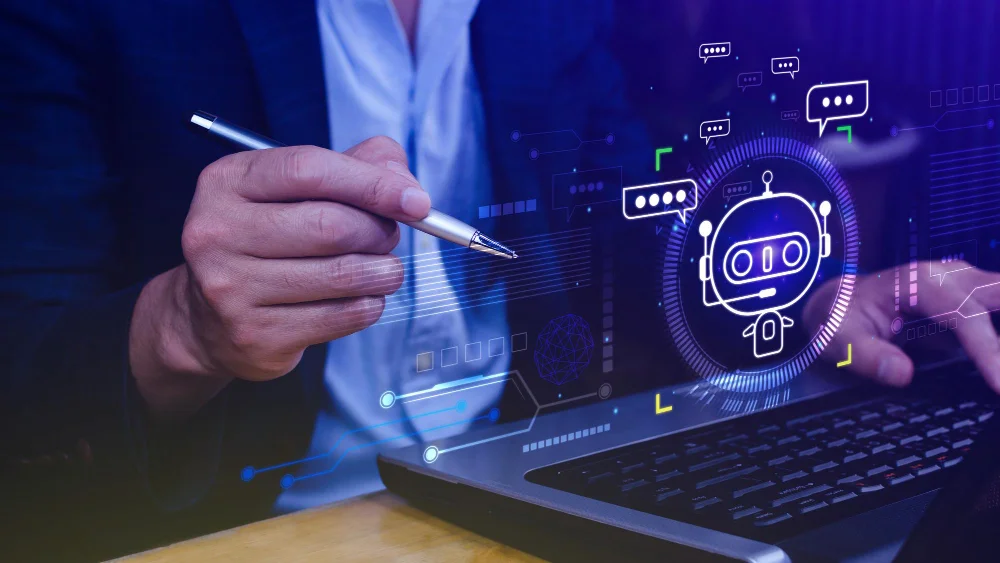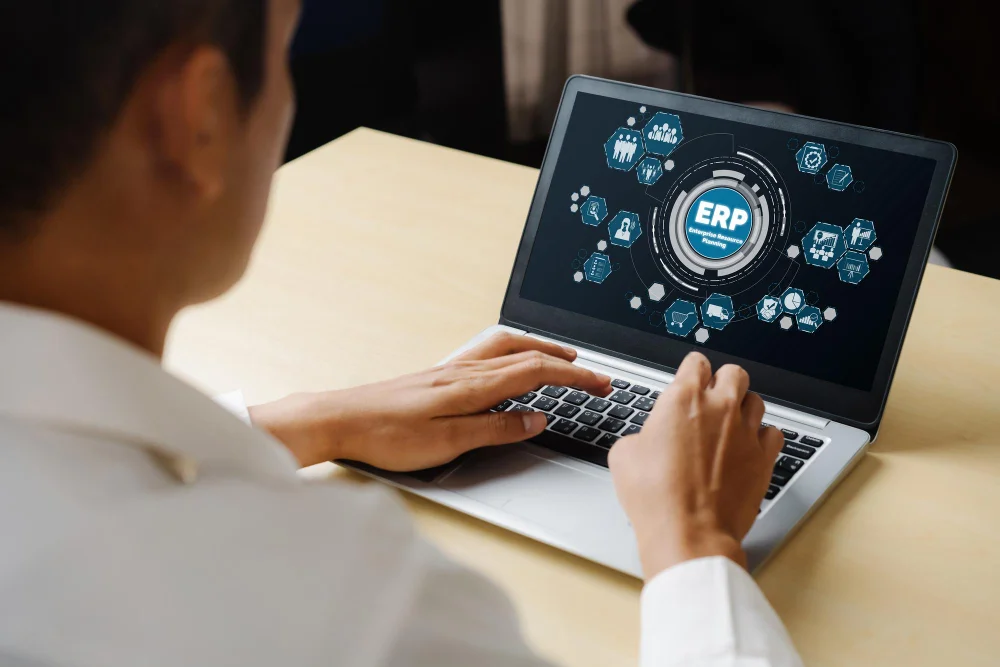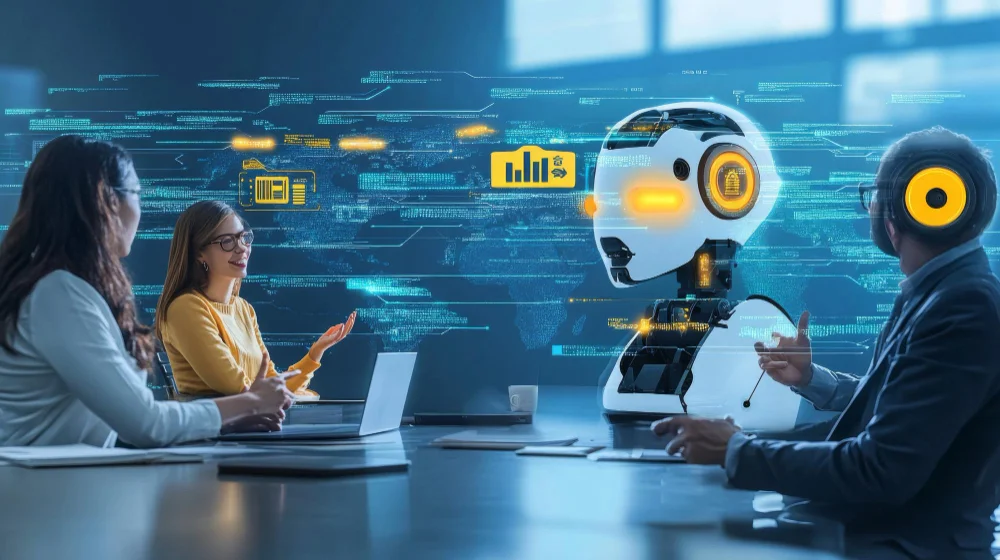In the fast-paced world of business, Enterprise Resource Planning (ERP) systems have evolved from basic management tools into sophisticated platforms. The future of ERP is increasingly intertwined with artificial intelligence (AI) and machine learning.
These are set to redefine how organizations operate.
Originally, ERP systems were designed to streamline core business processes such as:
- Accounting,
- Inventory management, and
- Human resources
However, over the years, they have transformed into comprehensive solutions that integrate various business functions into a unified system.
Today, ERP systems are indispensable for modern enterprises, with 95% of organizations enjoying business process improvement, thanks to AI in ERP.
The integration of AI and machine learning is accelerating this transformation. AI enables predictive analytics. Similarly, Machine learning enhances automation, learning from historical data to improve decision-making processes continuously.
This shift is not a mere advancement but a necessity. Here’s why:
Why AI and Machine Learning Are Crucial for the Future of ERP

As ERP systems evolve, the integration of AI and machine learning is becoming increasingly crucial. Here are a few reasons why:
- Current Trends in ERP:
Data Overload: Firstly, Modern enterprises generate vast amounts of data that traditional ERP systems struggle to manage effectively.
Need for Real-Time Insights: Moreover, there is a growing demand for ERP systems to provide real-time data and insights to support quick decision-making.
Manual Processes: Many ERP systems still rely on manual data entry and processing, leading to inefficiencies and errors.
- Challenges Facing ERP Systems:
Integration Difficulties: Integrating disparate systems and data sources can be complex and time-consuming.
Scalability Issues: As businesses grow, their ERP systems must scale efficiently without compromising performance.
Adaptability Concerns: Furthermore, traditional ERP systems may lack the flexibility to adapt
to rapidly changing market conditions and business needs.
- The Need for Smarter Operations:
Enhanced Automation: AI in ERP can automate routine tasks, reducing manual effort and the risk of errors while improving smart operations.
Predictive Analytics: Additionally, Machine learning in ERP allows to analyze historical data and predict future trends, helping businesses stay ahead of market shifts.
Improved Decision-Making: With AI-driven insights, companies can make more informed and timely decisions, enhancing their strategic planning and operational effectiveness.
- Competitive Advantage:
Faster Response Times: AI and machine learning allow businesses to respond more swiftly to market changes, giving them a competitive edge.
Optimized Operations: Moreover, these technologies streamline processes and improve resource management, leading to cost savings and better overall performance.
Enhanced Flexibility: Lastly, AI-powered ERP systems offer greater adaptability to evolving business needs and industry trends, ensuring long-term relevance and success.
The Role of AI in the Future of ERP

As businesses strive to stay ahead in a competitive landscape, the integration of AI into ERP systems is becoming more than just a trend. Let’s explore how AI is shaping the future of ERP through advanced analytics, forecasting, and automation.
- AI-Powered Insights and Analytics
AI is revolutionizing the future of ERP by transforming how data is analyzed and decisions are made. Traditional ERP systems often rely on static reports and historical data, but AI introduces dynamic capabilities that enable real-time insights and deeper analysis.
For instance, advanced AI algorithms can sift through vast amounts of data to uncover patterns and trends that might not be immediately apparent. This results in more accurate and actionable insights, allowing businesses to make informed decisions swiftly.
A notable example is how Siemens implemented AI in their ERP system to enhance predictive maintenance, significantly reducing downtime and improving operational efficiency.
- Predictive Analytics and Forecasting
Predictive analytics powered by AI is another game-changer for ERP systems. By leveraging historical data, AI can generate accurate forecasts and trend analyses, which are crucial for strategic planning.
For example, retail giant Walmart uses AI-driven predictive models to optimize inventory management, ensuring that stock levels align with consumer demand. This predictive capability helps in anticipating market changes and adjusting strategies accordingly.
Consequently, businesses can better align their resources and strategies with future demands.
- AI in Automation and Efficiency
AI’s impact on automation and efficiency within ERP systems cannot be overstated. Routine tasks such as data entry, invoice processing, and report generation can be automated using AI. Thus, freeing up valuable time for employees to focus on more strategic activities.
For instance, IBM’s Watson AI has been employed to automate customer service processes in ERP systems, drastically reducing response times and enhancing customer satisfaction.
Moreover, AI minimizes manual errors by standardizing processes and improving accuracy. The result is a more efficient and error-free operation, which translates into significant cost savings and productivity gains.
Integrating AI and Machine Learning into ERP Systems

As the integration of AI and machine learning becomes more prevalent in ERP systems, it’s crucial for businesses to approach this transition thoughtfully. Let’s dive deeper into how to make this integration a success.
1. Key Considerations for Integration
Integrating machine learning and AI in ERP systems is not just a technical upgrade, it requires a strategic approach. The first step is assessing organizational readiness for AI and machine learning, which involves evaluating:
- Current ERP capabilities,
- Workforce skills, and
- Data infrastructure.
Companies must identify gaps in their existing systems and determine whether their teams are equipped to handle advanced technologies. Choosing the right tools and technologies for integration is equally crucial.
Moreover, organizations should look for AI and machine learning solutions that are compatible with their ERP software, scalable, and capable of delivering real-time insights.
2. Challenges and Solutions
While the integration of machine learning and AI in ERP promises significant benefits, it comes with its own set of challenges. One of the most common challenges is data quality; AI-driven ERP systems rely heavily on accurate and comprehensive data.
Therefore, poor data quality can lead to flawed insights and ineffective decision-making. To overcome this, businesses should prioritize data cleansing and establish robust data governance practices.
Moreover, another challenge is the complexity of integration, especially when dealing with legacy ERP systems that may not be compatible with modern AI technologies. However, partnering with experienced vendors can help smooth the integration process and ensure successful implementation.
3. Future Trends in AI and ERP Integration
As AI and machine learning continue to evolve, several emerging trends are set to shape the future of ERP systems. One of the most promising trends is the rise of hyper-automation, where AI automates not just routine tasks but complex processes that involve decision-making.
Additionally, AI-powered ERP systems are expected to integrate more seamlessly with Internet of Things (IoT) devices. Thus, enabling real-time data collection and analysis from a multitude of sources.
Looking ahead, the future of ERP will also be influenced by advancements in natural language processing. This will allow users to interact with ERP systems through voice commands and conversational interfaces.
4. Practical Steps for a Successful AI-ERP Integration
To successfully integrate machine learning and AI in ERP systems, organizations should start by developing a clear roadmap that aligns with their strategic goals. This involves:
- Setting realistic timelines,
- Defining key performance indicators (KPIs), and
- Establishing a governance framework to monitor progress.
Furthermore, regularly reviewing the impact of AI in ERP processes and making adjustments as needed is essential for continuous improvement. Moreover, companies should not overlook the importance of change management.
This includes involving stakeholders early and communicating the benefits of the integration can help drive adoption across the organization.

Conclusion
The integration of AI in ERP is not just a trend, it’s a pivotal shift that defines the future of ERP.
By embracing AI in ERP systems, businesses can:
- Drive smarter operations,
- Improve decision-making, and
- Stay competitive in a rapidly evolving market.
Additionally, as the future of ERP continues to evolve with AI and machine learning, organizations that invest in these technologies will lead the way, transforming how they operate and achieve success.
Therefore, now is the time to act and prepare for the future of ERP with AI at the core.
FAQs about the Future of ERP
1. How does AI in ERP enhance decision-making processes?
AI in ERP enhances decision-making by providing real-time data analysis, predictive insights, and automated recommendations. Thus, enabling managers to make more informed and strategic decisions based on accurate information.
2. What are the key benefits of integrating AI and machine learning into ERP systems?
The key benefits of integrating AI in ERP systems include improved operational efficiency, automation of routine tasks, enhanced data analytics, personalized user experiences, and the ability to forecast trends and outcomes more accurately, shaping the future of ERP.
3. How can companies assess if they are ready for AI integration in ERP?
To assess readiness for AI in ERP, companies should evaluate their current ERP capabilities, data quality, workforce skills, and IT infrastructure.
4. What are the future trends of ERP systems with AI and machine learning?
The future of ERP with AI includes trends such as hyper-automation, integration with IoT devices, enhanced natural language processing for user interactions, and advanced predictive analytics.
5. What challenges do businesses face when integrating AI in ERP, and how can they overcome them?
Common challenges in integrating AI in ERP include data quality issues, compatibility with legacy systems, and the complexity of implementation. Businesses can overcome these by investing in data management, selecting compatible AI technologies, and partnering with experienced vendors like advansappz to guide the integration process.












